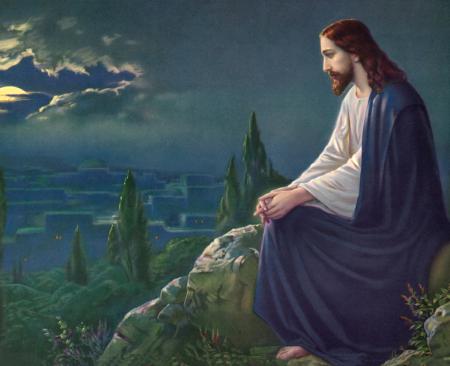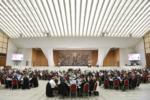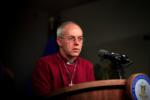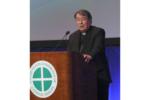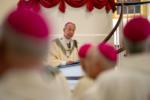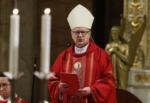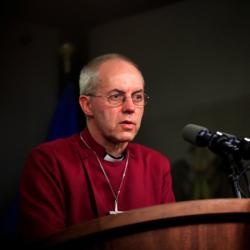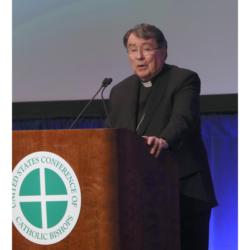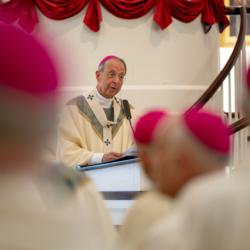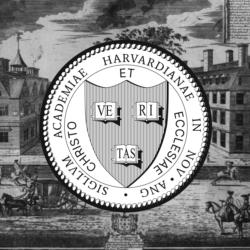Msgr. Hehir honored at Pastoral Center
BRAINTREE -- In 2003, when Cardinal Seán P. O'Malley was installed as Archbishop of Boston, Msgr. J. Bryan Hehir, currently archdiocesan secretary of health and human services, was working with Catholic Charities USA in Washington, D.C.
For over 20 years before that, he was an aide for the U.S. Conference of Catholic Bishops. That was where he first met Cardinal O'Malley, who was then a young priest in Washington working with immigrants. The Catholic Charities job required extensive travel, so Msgr. Hehir was unable to make it to Cardinal O'Malley's installation.
When he returned to Washington, he received a list of missed calls from his secretary, a woman who was great at her job but knew little about the Catholic Church.
"Now, a man named O'Malley called, and he would like to talk to you," she told Msgr. Hehir.
"Winnie, I think I can make that," he replied.
It was that phone call that brought Msgr. Hehir to Boston.
Msgr. Hehir, recently named a monsignor by Pope Francis, was honored for his years of service to the archdiocese during a Mass celebrated by Cardinal O'Malley in the Bethany Chapel, located in the Archdiocese of Boston Pastoral Center in Braintree.
"Today, we're going to honor a priest who's done so much to help people understand and embrace the social teaching of the church, the great themes of the social gospel that we are always dealing with in our lifetime," Cardinal O'Malley said in his homily. "Economic justice, civil rights, war and peace, response to the migrants. So many things, and for us as believers, these are all part of the Great Commandments, all part of the way that we are called to love God and to love one another."
In his remarks after Mass, the cardinal said that Msgr. Hehir is proof that a priest can live an academic life while still being in tune to people's pastoral needs.
"Your teaching and ministry have been a great source of service to the church and inspiration to countless people outside the church," he said.
Msgr. Hehir has a Master of Divinity degree from St. John's Seminary and a doctorate in theology from Harvard Divinity School. Until 2021, he was the Parker Gilbert Montgomery Professor of the Practice of Religion and Public Life at Harvard University's Kennedy School of Government.
"What makes it even more beautiful is that in the life of Bryan Hehir, being Father Hehir was more important than being Professor Hehir or Dr. Hehir," the cardinal said.
He recalled that in Washington, Father Hehir did not live with his fellow USCCB staff members in housing provided for them at the Catholic University of America. Instead, he lived in a parish because he wanted to remain involved in the lives of the faithful.
"I knew parishioners there who didn't realize he had a full-time job at the bishops' conference," the cardinal said. "They thought he was the assistant pastor because they saw so much of him."
After Mass, the cardinal presented Msgr. Hehir with a framed copy of the papal decree naming him a monsignor.
After acknowledging the standing ovation he received, Msgr. Hehir offered remarks to the assembly.
"Every Mass is a commemoration of the sacrifice of Christ, is a celebration of the Sacrament of the Eucharist, and every Mass is a great act of thanksgiving," he said. "So that's really what this has to be for me. It's an attempt to say, 'thank you.'"
He thanked his friends, family, colleagues, and brother priests who were present, and, most of all, he thanked Cardinal O'Malley.
"It has been a privilege to serve under him and work with him," he said.
Msgr. Hehir praised Cardinal O'Malley's initial leadership in the wake of the clergy sex abuse crisis and thanked the cardinal for letting him take part in it.
"People had lost their trust in the church," he said. "They didn't lose their faith. They lost their trust in the institution which was meant to minister that faith."
He said the cardinal rebuilt trust in the archdiocese "by simply building personal trust."
"One by one, day by day, week by week, simply ministering in the style of the Gospel," he said. "And slowly, slowly, the trust people came to have in him was the first step on a journey that we're still on. This won't be healed easily, but it can be healed, and he demonstrated it."
Msgr. Hehir said that in a polarized nation, and even a polarized church, "it's hard to put your foot down on the ground and do the preaching and celebrating the sacraments and ministering to people's lives."
He described Cardinal O'Malley as being able to do that. Advocates for Catholic teaching on every issue, from social justice to abortion and physician-assisted suicide, saw him as an ally to their cause.
"What he demonstrates is that not only can we rebuild the trust between us, but the way to do it is to honor the sacred dignity of every human person, and do so across the spectrum of life," he said.
He quoted Protestant theologian Paul Ramsey as saying that the church must protect life and human dignity "from womb to tomb."
"I am deeply grateful that I was able to be there and to help out," he said, "and I hope to be able to continue to do that until the Lord decides that I would run out of life and breath or good judgment."
